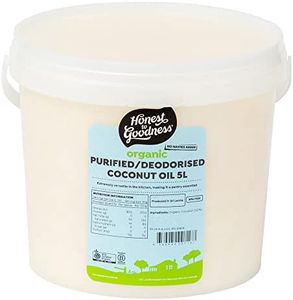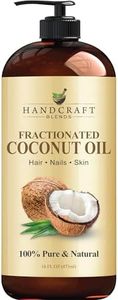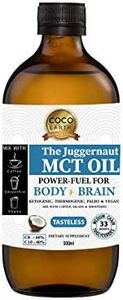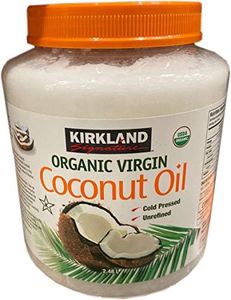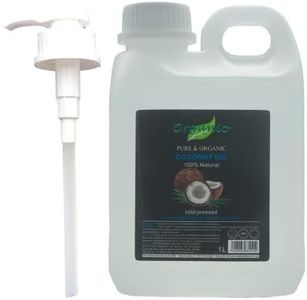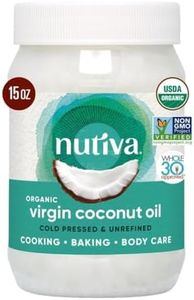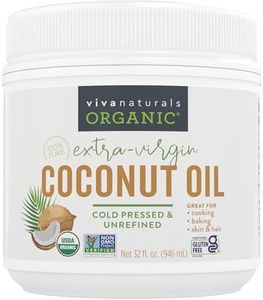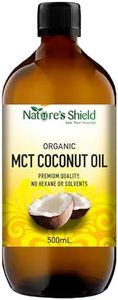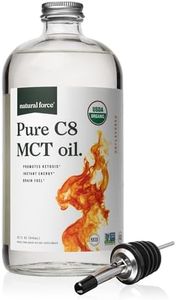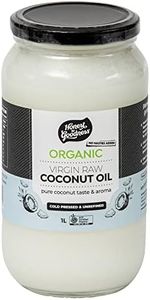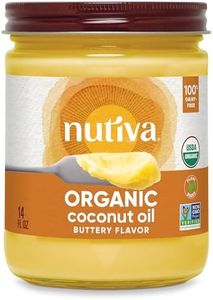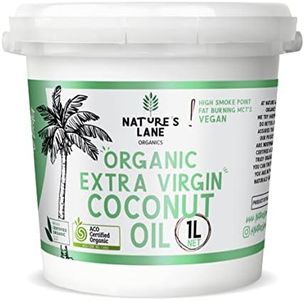We Use CookiesWe use cookies to enhance the security, performance,
functionality and for analytical and promotional activities. By continuing to browse this site you
are agreeing to our privacy policy
10 Best Coconut Oils
From leading brands and best sellers available on the web.By clicking on a link to a third party's website, log data is shared with that third party.
Buying Guide for the Best Coconut Oils
Choosing the best coconut oil starts by understanding what you'll use it for—cooking, skin or hair care, or even general wellness. There are different types and characteristics of coconut oil, and what works best for one person might not be the best for another. Always think about your own needs and lifestyle when comparing options. The right coconut oil for you will be the one that fits your intended use, preferences for scent and flavor, and any sensitivities you may have.Type (Virgin vs. Refined)This spec refers to how the coconut oil is processed. Virgin coconut oil is made from fresh coconut meat and is minimally processed, so it retains more flavor and nutrients. Refined coconut oil is processed from dried coconut and is often bleached and deodorized, resulting in a milder flavor and higher smoke point. If you want a natural aroma and more nutrients, go for virgin; if you prefer minimal scent and taste, or need a neutral oil for high-heat cooking, refined is better. Your main use will guide the right choice.
Extraction MethodThis tells you how the oil is taken from the coconut. Cold-pressed and expeller-pressed are common methods. Cold-pressed means lower heat is used, helping preserve more nutrients and flavor. Expeller-pressed uses more heat and pressure, which might reduce some benefits but can make the oil more affordable. For maximum nutrition and a fresher taste, cold-pressed is usually recommended, especially for non-cooking uses.
Texture (Solid vs. Liquid)The texture describes whether the oil is solid at room temperature (which is common for coconut oil below 76°F/24°C) or liquid, often labeled as 'fractionated.' Fractionated coconut oil stays liquid and is great for skin and hair use, while traditional coconut oil will solidify in cooler climates. Think about where and how you’ll store the oil, and whether you need it to stay liquid for your uses.
Scent and TasteThis spec reflects how strong or mild the coconut aroma and flavor are. Virgin oils tend to have a noticeable coconut scent and taste, while refined oils are almost odorless and flavorless. If you like the tropical aroma or plan to use it in recipes where coconut flavor is welcome, pick a strongly scented one; otherwise, a mild oil works best for general or beauty purposes.
Packaging and StoragePackaging refers to the type of container—glass jars, plastic tubs, or bottles—and the quality of sealing. Good packaging keeps the oil fresh and safe from light or air, which can spoil it faster. Glass is usually better for purity and long-term storage, especially if you want to avoid plastics for health or environmental reasons. Pick a size and container that fits your usage pattern; smaller jars are better for occasional use while larger containers suit heavy users.
Organic and CertificationThis spec tells you if the oil is certified organic, non-GMO, or has other quality assurances such as fair trade. Organic certification means the coconuts were grown without synthetic pesticides or fertilizers, which is important for those focusing on health or the environment. Certifications give extra assurance about farming and processing practices, so prioritize them if these values matter to you.
